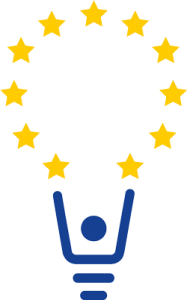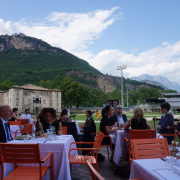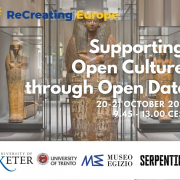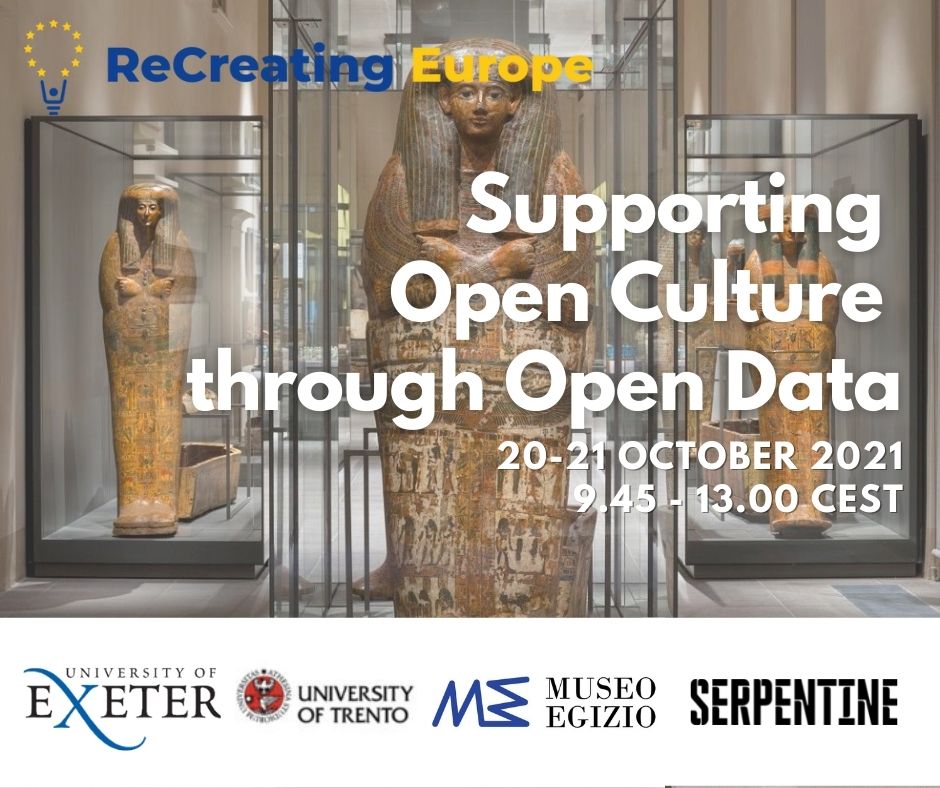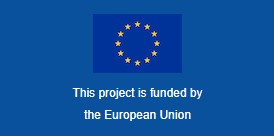Report: Open Up Museums! Workshop, Trento/Rovereto
This May (26-27 May, 2022) saw a return to travelling for the reCreating Europe project, as project partners headed to Italy for the first of two GLAM @ Home workshops – ‘Open Up Museums! Prospects and Challenges of Accessibility, Diversity and Inclusion’, organised as a collaboration between projects DANCING, inDICEs. A valley enclosed on all sides by looming mountains is not the most obvious setting for a workshop which focuses on ‘openness’ – but the surroundings gave a dramatic backdrop to the two-day workshop. Amongst the full programme, participants enjoyed the superb hospitality of the two host museums – MuSe (Trento) and Mart (Rovereto).
The below report summarises the workshop content, and is interspersed with the thoughts of speakers and attendees who were asked to reflect on the question – ‘What does an ’open museum’ mean to you’?
Day 1 – MuSe (Trento)
Panel 1: Museums, intellectual property, and access to culture (Author: Giulia Dore)
‘An open museum is a museum that can listen to every kind of people, that can communicate with every kind of public, understand the requirements of different people and constantly tries to create, innovate and develop in terms of accessibility. An open museum can be considered as a house for everyone.’ – Patrizia Famà
The two-day-long program started with the Museums, intellectual property, and access to culture panel, which was opened by Patrizia Famà, who highlighted the importance of the cultural preservation institutions. Chaired by Giulia Dore (University of Trento), the opening panel explored the concepts of openness and access to culture in relation to the digital mission of museums. After an opening welcome from Roberto Caso (University of Trento), speakers highlighted the features of an extremely complex regulatory framework focusing on copyright, cultural heritage law and data management, discussing the challenges and opportunities of specific policies aimed at making museums open to all.
Kristina Petrasova (the Netherlands Institute for Sound and Vision) brought her experience as a researcher and cultural heritage practitioner to explore the choice of implementing open policies in the cultural sector.
Marta Arisi (University of Trento) illustrated one of the most controversial tasks of cultural heritage establishments, that is access and re-use of cultural data across copyright and data protection laws.
Barbara Pasa (University of Venice Iuav) deepened the discussion around the concept of artistic reuse of works exemplifying the carousel rides of CHIs that collide with their attempts to perform their mission to the fullest.
Fiona Macmillan (Birkbeck College, University of London) called for an inclusive community approach to cultural heritage, to be understood as the result of a social process where people enjoy, participate and share, hence giving true substance to the concept of open culture.
‘An open museum is a museum without restrictions, especially in terms of copyright law, which is imposed on museums that try to fulfill their public mission. As long as museums can do what the society makes them do, like preserve and share their resources.’ – Konrad Gliściński
Konrad Gliściński (Jagiellonian University/Centrum Cyfrowe) argued that copyright needs to adjust itself not to frustrate but rather to facilitate the many and increasingly more ambitious missions of CHIs.
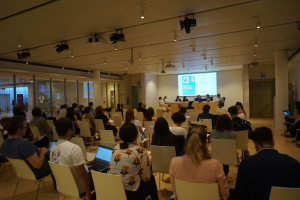
A lively discussion around the question ‘How can CHIs concretely play an active and participatory role in the process of redesigning copyright?’ closed the panel with a message of hope: that they should all be aware, trained and fearless of tackling this issue together.
Panel 2: Barriers to access to digital culture for vulnerable groups, inclusivity and the implementation of the Marrakesh Treaty (Author: Lorenzo Beltrame)
‘An open museum is means to bring culture to everyone, everywhere, in every condition. This is why we commit spreading out our culture and the Egyptian culture as a means of communication with everyone around the world. This is why we involve minority communities and people who live in difficult situations, like prisons and hospitals, to virtually visit our museum. We bring the museum to the people with online collections and activities.’ – Alessia Fassone
This panel addressed issues of accessibility to cultural resources for vulnerable groups. Obstacles to full access experienced by people with visual impairments, blind people, minorities, marginalized groups and people with disabilities were discussed by the panelists.
Katie Donnellan, Delia Ferri and Noelle Higgins, from Maynooth University, presented their empirical research on the barriers to access to digital culture for minority groups and people with disabilities. Their research showed how, notwithstanding an improved sensibility in making cultural resources more accessible to vulnerable groups, issues of underrepresentation, cultural appropriation and stereotypes are still present. Their research also illustrated how there is a limited understanding of copyright law as a barrier and patchy knowledge about the Marrakesh Treaty and about how it can improve accessibility through copyright exception.
Giulia Rossello, from Scuola Superiore Sant’Anna, presented her empirical research on the perceived benefits of the Marrakesh Treaty experienced by people with visual impairment in six European countries. Her research has brought evidence of how perceived benefits are linked to the type of visual impairment and the technology used.
‘An open museum is a place where I feel welcome, triggered and inspired to discover people’s stories and to somehow see my own history reflected. It’s a place where not only I am welcome, but also all people I can think of, to feel no hindrance to walk together with me, and where I don’t feel the pressure to leave. An open museum is ideally a 24/7 store where all people can come and ‘shop’ for a cultural experience that serves their passion for culture.’ – Sofie Taes
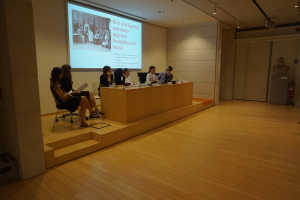 Sofie Taes, from Catholic University of Leuven, discussed the topic of misrepresentation and cultural bias embedded in the metadata of archived photographs from the point of view of archival curators.
Sofie Taes, from Catholic University of Leuven, discussed the topic of misrepresentation and cultural bias embedded in the metadata of archived photographs from the point of view of archival curators.
Finally, Alessia Fassone and Federica Facchetti, from Museo Egizio in Turin, presented some examples of active inclusion of marginalized groups (like immigrants and prisoners) in the cultural activities of their museum.
Training session on legal and practical aspects related to digitization (Author: Marta Arisi)
‘An open museum for me is a museum where I can go anytime with my friend with disabilities or with a baby carriage, or with my luggage if I travel, and I don’t feel any problems with that.’ – Irina Tekhucheva
The training session was a thrilling moment of the GLAM@Home Workshop! Here, participants of different backgrounds and ages worked together to put the ideas and concepts of the morning session into practice. This took place in the impressive learning space at Muse, Trento.
In the first part, Maria Tartari and Francesca Manfredini from inDICEs explored the project and introduced its exciting participative tool – the Open Observatory. We learned how CHIs can build a participative digitisation strategy, exploring different venues and tips that truly enable Culture 3.0.
Later, Giulia Dore and Marta Arisi, as part of the reCreating Europe WP5 team from University of Trento, focusing on GLAM, acted as facilitators while groups worked to solve a case scenario. The case is available through the reCreating Europe stakeholders platform. We discussed copyright issues arising from a museum’s project for a collective digitisation campaign and art project, using public domain works and photographs thereof. Please feel free to contribute – follow-up on this controversial and fascinating debate is always welcome!
Day 2- Mart (Rovereto)
For the second day of the conference, the whole team travelled to the town of Rovereto. Keeping accessibility to culture in mind, the organisers created braille programmes, invited sign language interpreters, and live Italian-English translation was offered.
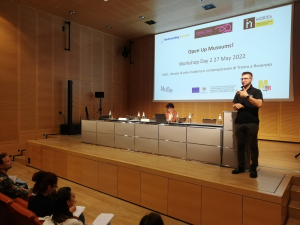
The programme was opened by Sara Di Giorgio (Ministero della Cultura) and Aldo Grassini (President of Museo Omero) who gave the first keynote speech of the day, discussing the importance of broadening the definition of cultural interaction to allow blind people access to cultural heritage.
Panel 3: Fostering Accessibility for Persons with Disabilities in Cultural Organisations: Legal Tools, Experiences and Best Practices (Author: Delia Ferri)
‘An open museum is accessible to all members of society, and especially vulnerable and marginalised groups, like persons with disabilities and persons belonging to minorities.’ – Katie Donnellan
The third panel of the workshop focused on fostering accessibility for persons with disabilities in cultural organisations. Chaired by Professor Delia Ferri (Maynooth University), Principal Investigator of the DANCING project, funded by the European research Council (grant agreement No. 864182), the panel included six speakers.
The first three presentations discussed legal tools that support access to culture, as well as barriers and facilitators to cultural participation for persons with disabilities. In particular, Léa Urzel (DANCING, Maynooth University) discussed the UN Convention on the Rights of Persons with Disabilities as a main legal tool to fostering accessibility for persons with disabilities. Professor Ferri discussed the role of EU law in enhancing access to cultural goods and services, with particular attention on the Web Accessibility Directive and the European Accessibility Act. Dr. Ann Leahy (DANCING, Maynooth University) presented empirical findings of the DANCING research project focusing on factors that prevent or facilitate access to culture.
‘An open museum is a museum that is accessible to everyone, including persons with disabilities. A museum has to be open to everyone, so it needs to consider the diversity of the people, with their abilities and disabilities, so people can enjoy the museum on an equal basis with others.’ – Delia Ferri
Those speeches were followed by a set of presentations on best practices. Ginevra Niccolucci of PRISMA, expert in cultural heritage communication, showcased her work within Museo4U. Katia Franzoso of MuSe and Ornella Dossi of Mart shared their respective experiences and practices of making their exhibitions and venues accessible to all. The panel was bilingual, and simultaneous English – Italian translation was offered. This was complemented by Italian Sign Language interpretation to support accessibility.
Panel 4: Inhabiting culture: digitisation, copyright and creativity in placemaking (Authors: István Harkai and Marta Iljadica)
‘An open museum is a place that has to trust the younger generation.’ – Barbara Pasa
After the second and final keynote speech of the conference delivered by James Bradbourne (Director of Pinacoteca Brera), another exciting panel led by Marta Iljadica (CREATe, Glasgow University) considered placemaking, especially how places are created and experienced with particular reference to cultural heritage, digitisation, and copyright through multiple disciplinary perspectives.
Aleksandra Janus (Centrum Cyfrowe) kicked off the presentations by highlighting the value of digital cultural heritage and its importance to communities, identities, and places. Maria Della Lucia (University of Trento) then presented work exploring how places are made and re-made through culture, creativity, and tourism. Umberto Cecchinato (Università Roma Tre), presenting work undertaken with Massimo Rospocher (Istituto Storico Italo Germanico – Fondazione Bruno Kessler), spoke about the use of mobile application technologies to discover the hidden histories of cities as part of the Hidden Cities project and introduced the Hidden Trento app.
Finally, István Harkai (University of Szeged) and Francisco Duque Lima (Katholieke Universiteit Leuven, Centre for IT & IP Law) then shifted focus to video games by exploring the challenges of preserving virtual worlds, the challenges of live streaming video games and how this links to placemaking.
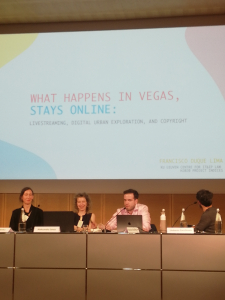
‘There are two types of openness. It’s partly a physical question, a museum has to be accessible to everyone in the community. And it’s partly a metaphysical question, that is the question of the ability to interact with the things that are on the display. If cultural heritage is about social process, and museums are about cultural heritage, then by definition a museum must be open, it must be a place that you can not only access, but also can use it to engage with other people.’ – Fiona Macmillan
The workshop was a superb opportunity for members of all three projects – reCreating Europe, inDICEs and DANCING – to reconnect, create new synergies and share inspiration. Furthermore, by setting the workshop in two museums that are striving to become ‘open museums’ in all sense of the phrase, the theoretical content was grounded in reality, and the practicalities of making cultural heritage accessible were ever present. The reCreating Europe project looks forward to continuing the collaborations formed during the organisation of this workshop, as it continues to work towards redefining copyright law for a culturally diverse, accessible and creative Europe.
